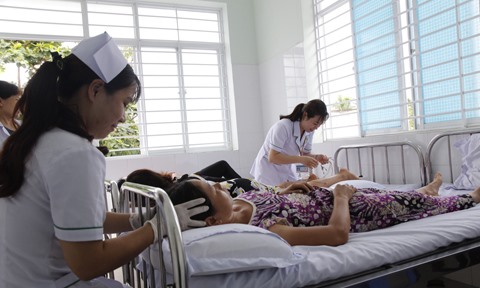 Society
Society

When she rushed to a nearby health station last month for immediate medical help, Trần Mai Kiều, 32, a housewife from HCM City’s District 11, was turned away since the only doctor there was absent.
 |
| Patients at the traditional medicine department at the Thảo Điền Ward Health Station in HCM City’s District 2. — Photo San Hà |
San Hà
HCM CITY — When she rushed to a nearby health station last month for immediate medical help, Trần Mai Kiều, 32, a housewife from HCM City’s District 11, was turned away since the only doctor there was absent.
She had cut her hand with a broken glass and bleeding severely. She then had to go to the District 11 Hospital.
For years health stations in the country have mostly failed to provide both immediate medical help and regular treatment.
HCM City is home to 319 health stations which only treat 3 per cent of the total number of patients in the city, according to the Department of Health.
Lack of doctors, poor facilities and limited quantities of drugs mean they are not favoured by people seeking medical treatment.
Tăng Chí Thượng, deputy director of the department, said it is not uncommon to see health stations with a single doctor who is in charge of a number of tasks such as the national immunisation programme, disease prevention and control programmes and the management of tuberculosis and HIV in their locality.
“People do not trust the health stations, resulting in low patient volume.”
Dr Đỗ Thị Bưởi, head of the Ward 5 Health Station in HCM City’s District 8, said only five to 10 people turn up every day and only for immunisation, changing wound dressings and getting insulin shots for diabetes and not for check-up and treatment.
Under a health insurance policy that came into effect in 2016, unlike before insured patients can get diagnosed and treated at any district-level health facility without requiring referral papers from medical facilities in their neighbourhood.
As a result, now patients go straight to district-level hospitals instead of visiting grassroots healthcare establishments.
Many district-level hospitals such as the District 2 Hospital, Tân Phú District Hospital and Thủ Đức District Hospital suffer from a patient overload as a result, Thượng said.
New models
Healthcare authorities are currently testing three new models to improve the quality of the grassroots healthcare service, he said.
Earlier this month the District 2 Hospital set up a satellite general clinic at the Thảo Điền Ward Health Station where 17 specialists treat a range of ENT, dental, paediatric, and dermatological ailments and also provide traditional medicine.
Trần Văn Khanh, director of the District 2 Hospital, said the hospital has spent VNĐ10 billion (US$434,700) on buying modern medical equipment and deploying specialists at the clinic.
“Local people can access medical services without travelling far to hospitals.”
The clinic is expected to get more than 300 insured outpatients daily, he said.
In 2016 the Thủ Đức District Hospital pioneered satellite general clinics at grassroots health establishments.
Its satellite general clinic at the Bình Chiểu Ward Health Station gets around 200 outpatients a day.
Nguyễn Minh Quân, director of the hospital, said the hospital is overstretched, with around 5,000 outpatients coming every day for treatment.
The hospital used its own funds to set up satellite general clinics by upgrading existing health stations and deploying doctors and staff there, he said.
In the last two years four satellite general clinics have been set up at health stations in districts 2, Thủ Đức and Tân Phú.
Preliminary results show they have benefited insured patients and helped reduce the patient overload at many hospitals, according to Thưo75ng.
The number of satellite general clinics is expected to increase in the city in the next few years, he said.
The city has also adopted the public-private partnership model at health stations to strengthen primary health care at the grassroots level.
In mid-2017 the Việt Anh Health Joint Stock Company together with the department opened the DHA Clinic at District 3’s Ward 11 health station.
More than 40 per cent of residents in Ward 11 have visited the clinic, mostly for regular preventive health checks and tests.
The company plans to invest in similar clinics at other health stations in District 3.
Family medicine
One health station in each of the city’s 24 districts have been chosen to join a national programme that aims to strengthen primary health care in keeping with family medicine principles, Thượng said.
“The family medicine principles are to provide comprehensive and continuing care to individuals and families.”
Under the programme, participating health stations will be assisted with improving the competence of teams at the grassroots level and provided essential equipment.
Minister of Health Nguyễn Thị Kim Tiến said the health sector failed to realise the potential of health stations, which cover every part of the country.
With appropriate investment and drastic measures for the development of the grassroots healthcare network, more and more patients would visit health stations, helping reduce the overload at higher level hospitals, she said.
In future non-communicable diseases such as hypertension, diabetes, heart disease, and chronic respiratory diseases would be prevented and treated at health stations, she said. — VNS




